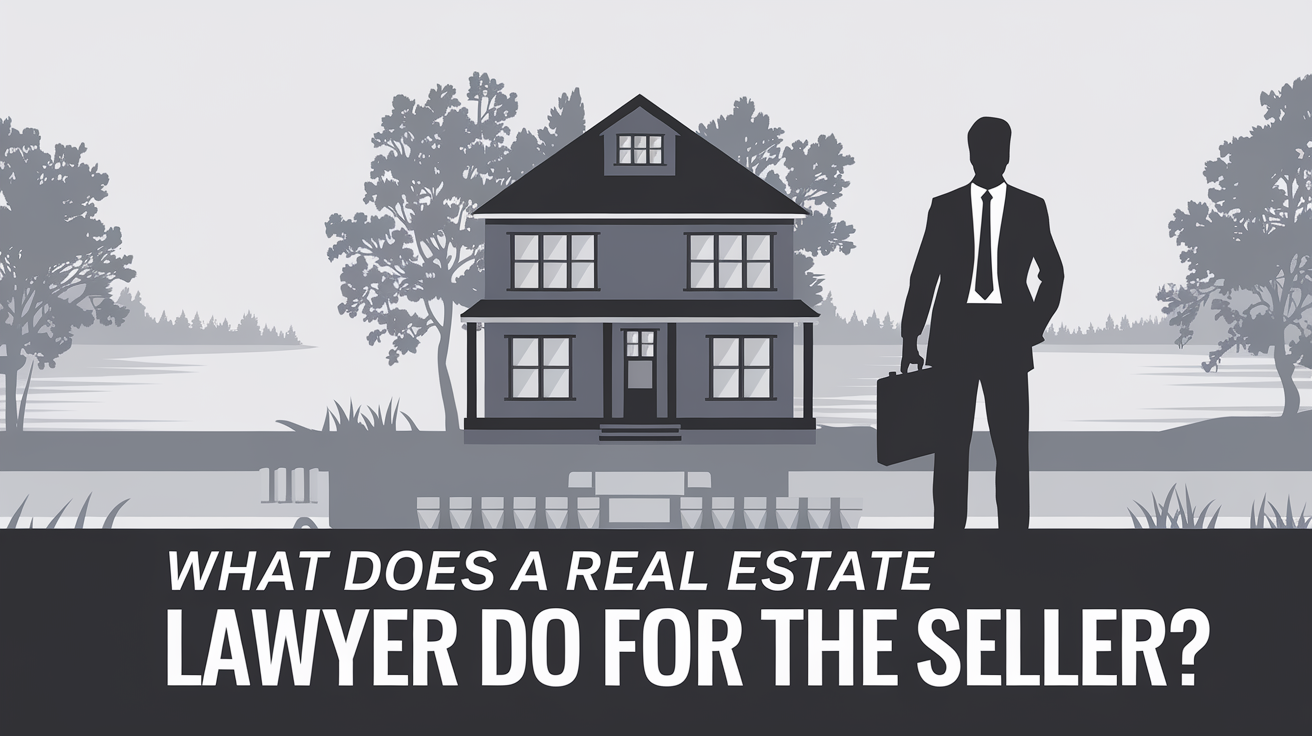
- Tajinder Kaur Sivia
- 11-Feb-2025
Selling a home is a big decision. Legal paperwork, negotiations, and financial transactions are all contained in it. The presence of a real estate lawyer will go a long way in making the process very smooth, and stress-free.
When you are selling a property, here is one question that comes to your mind: Do I need a lawyer? In almost all cases, the answer is yes. The legal aspects of a real estate sale must be handled by an Ontario lawyer. Regardless of where you live, having a lawyer can spare you from the costly mistakes you can make and make a good outcome much more affordable.
We will explain below what kind of work a real estate lawyer performs for the seller in steps. Let’s dive in!
Reviewing the Sale Agreement
The Agreement of Purchase and Sale (APS) is the most important document in a real estate transaction. It outlines:
- The selling price
- Closing date
- Conditions (like home inspections or financing approval)
- Responsibilities of both buyer and seller
You sign the APS after a lawyer has reviewed the APS. They ensure you are being treated fairly and look after your interests while the terms are being agreed upon. They negotiate changes to keep out legal risks, if necessary.
Also, your lawyer makes the terms and conditions written so that there is no chance of any misunderstanding. When they read over the contract, they scan for any sneaky or hidden clauses that will work against you. Your lawyer will push to ensure better terms if there are conditions that could slow down the closing. Additionally, they state that they confirm that all legal requirements are met before settling this agreement.
Your lawyer can argue that if the buyer wants to back out because of minor inspection issues, the sale should go ahead as agreed. It is wise to have a lawyer check the APS since it will avoid unnecessary financial and legal troubles.
Also Read: - What does a real estate lawyer do ontario
Checking for Outstanding Liens or Debts
A lien is a legal claim on your property, often due to unpaid debts. If you have a lien, you must pay it off before selling.
Your lawyer will:
- Conduct a title search to check for any liens
- Ensure property taxes are up to date
- Confirm that there are no legal claims against your home
For example - You forgot about an unpaid utility bill, and the company placed a lien on your home. Your lawyer will inform you so you can settle it before closing.
Preparing Legal Documents
Selling a home requires a lot of paperwork. Your lawyer will draft and review essential documents, such as:
- The deed of transfer (which legally transfers ownership to the buyer)
- The statement of adjustments (which calculates final payments like property taxes and utility bills)
- Mortgage discharge documents (if you have a mortgage to pay off)
Your lawyer also prepares any additional documents required for the transaction, such as affidavits, statutory declarations, and closing statements. They ensure that all paperwork is correctly signed and submitted on time. Any errors or missing information could delay the sale or cause legal complications. Your lawyer double-checks all details to prevent mistakes.
Handling the Buyer’s Requests
Buyers often ask for changes before closing. They may:
- Request repairs for minor issues
- Ask for an extension on the closing date
- Question property boundaries
If the buyer requests repairs, your lawyer ensures that you are not obligated to fix minor cosmetic issues unless stated in the agreement. If the buyer asks for a closing extension, your lawyer will negotiate fair terms, such as requiring a deposit increase or a penalty fee to compensate for the delay. If there are property boundary disputes, your lawyer reviews land surveys and legal descriptions to clarify ownership. They work to resolve disagreements without delaying the sale.
Working with the Buyer’s Lawyer
A real estate sale involves two lawyers—one for the seller and one for the buyer. They communicate to finalize the deal.
Your lawyer will:
- Respond to any legal concerns from the buyer’s lawyer
- Provide necessary documents to confirm ownership
- Ensure that all conditions in the agreement are met
Your lawyer also goes over any last-minute changes the buyer’s lawyer wants. They check if there are title issues, unpaid property taxes, or outstanding liens. Finally, they guarantee that the final payment is received securely before handing over ownership. Your lawyer provides the necessary documents to clarify such things as zoning laws or property boundaries if the buyer’s lawyer objects to them.
Paying Off Your Mortgage
If you have a mortgage on your home, it must be paid off before you sell. Your lawyer will:
- Contact your lender to get a mortgage payout statement
- Ensure your mortgage is fully discharged from the property
- Transfer the remaining funds to you after the sale
Example: You owe $50,000 on your mortgage, and your home sells for $500,000. Your lawyer will pay the $50,000 to your lender, and then transfer the remaining balance to you.
Handling Closing Costs and Payouts
Selling a home involves certain costs, such as:
- Realtor commissions
- Legal fees
- Property taxes (if unpaid)
- Any outstanding condo fees (if selling a condo)
All such payments are duly settled by your lawyer before closing. Finally, these costs will be accounted for by them and they will deduct these costs from the sale price and transfer the final amount to you.
Ensuring a Smooth Closing Process
The closing day is the final step in selling your home. On this day:
- The buyer pays the remaining balance
- The property title is officially transferred
- You hand over the keys
Your lawyer makes sure everything goes along as planned and all the legal documents are entered into. The transaction is confirmed with the buyer’s lawyer and you’ll be informed when the sale is complete.
Once done, you officially no longer own the property!
Protecting You from Future Legal Issues
Even after the sale, legal problems can arise. A buyer may claim:
- The property had hidden defects
- You failed to disclose an issue
- There was a mistake in the paperwork
If this occurs, your lawyer defends you. They give proof that everything was done correctly, and they help resolve a dispute.
For example: A week after moving in, the buyer complains that the furnace no longer works. Your lawyer can prove that if you told what condition the furnace was in in the sale, you are not responsible for the repair.
Answering Your Questions
Selling a home can be confusing. Your lawyer is there to answer all your questions, such as:
- Do I have to pay capital gains tax?
- How do I handle the sale of a rental property?
- Can I stay in my home after closing for a few days?
Your lawyer also explains closing costs, legal obligations, and any special conditions in your sale agreement. If there are issues with the buyer’s financing, they guide you on your options. They clarify how to handle multiple offers, deposits, or buyer contingencies. If selling a condo, they help with status certificates and condo board requirements. A lawyer ensures you understand every step of the transaction.
They provide clear answers so you can make informed decisions. Whether it’s about tax implications, legal documents, or closing procedures, your lawyer is there to support you. Their expertise helps you avoid costly mistakes and sell with confidence.
Why You Need a Real Estate Lawyer as a Seller
You should understand that selling a home involves some legal and financial risk. A real estate lawyer will protect you during the whole process.
- Legal Protection – Mistakes in contracts can lead to costly lawsuits. After a lawyer has reviewed all these documents, he makes sure that everything they say is correct.
- Paperwork Free Payments – Payments are made directly and safely at the appointed times.
- Cost security – They reassure you that the buyer’s payment is received correctly and the correct amount received by you.
- Peace of Mind – Selling a home can be stressful. A lawyer takes care of legal details so you can focus on moving forward.
Even a simple sale can have unforeseen problems. This means that a buyer may have a question concerning the boundaries of the property; they can ask for last-minute repairs and there is a chance that the mortgage approval can take time. These challenges are all handled smoothly with the aid of a lawyer.
Your lawyer makes sure any liens, unpaid taxes, and mortgages are taken care of if your home has a mortgage. In addition, they protect you from future litigations as they ensure that all legal obligations are done.
This is all because a real estate lawyer safeguards your interests, saves you time, and makes sure that the sale is hassle-free. It is a smart decision for any home seller to hire one.
Also Read: - What is a common-law spouse entitled to in ontario
Final Thoughts
Selling a home is more than just finding a buyer. It involves legal documents, financial transactions, and careful planning. A real estate lawyer helps protect your interests, handle paperwork, and ensure a smooth closing process.
Whether it’s reviewing your contract, paying off your mortgage, or handling last-minute issues, a lawyer takes care of everything. They give you peace of mind knowing your home sale is safe and secure.
Are you planning to sell your home? Consult House Closing to make the process easy and stress-free!


